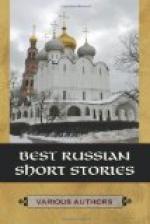The stubborn Socrates did, not spare the conscience of the good Athenians.
“We part! You go home and I go to death,” he said, to the judges after the sentence had been pronounced. “I know not, my friends, which of us chooses the better lot!”
As the time had approached for the return of the ship, many of the citizens had begun to feel uneasy. Must that obstinate fellow really die? And they began to appeal to the consciences of AEschines, Phaedo, and other pupils of Socrates, trying to urge them on to further efforts for their master.
“Will you permit your teacher to die?” they asked reproachfully in biting tones. “Or do you grudge the few coins it would take to bribe the guard?”
In vain Crito besought Socrates to take to flight, and complained that the public, was upbraiding his disciples with lack of friendship and with avarice. The self-willed philosopher refused to gratify his pupils or the good people of Athens.
“Let us investigate.” he said. “If it turns out that I must flee, I will flee; but if I must die, I will die. Let us remember what we once said—the wise man need not fear death, he need fear nothing but falsehood. Is it right to abide by the laws we ourselves have made so long as they are agreeable to us, and refuse to obey those which are disagreeable? If my memory does not deceive me I believe we once spoke of these things, did we not?”
“Yes, we did,” answered his pupil.
“And I think all were agreed as to the answer?”
“Yes.”
“But perhaps what is true for others is not true for us?”
“No, truth is alike for all, including ourselves.”
“But perhaps when we must die and not some one else, truth becomes untruth?”
“No, Socrates, truth remains the truth under all circumstances.”
After his pupil had thus agreed to each premise of Socrates in turn, he smiled and drew his conclusion.
“If that is so, my friend, mustn’t I die? Or has my head already become so weak that I am no longer in a condition to draw a logical conclusion? Then correct me, my friend and show my erring brain the right way.”
His pupil covered, his face with his mantle and turned aside.
“Yes,” he said, “now I see you must die.”
And on that evening when the sea tossed hither, and thither and roared dully under the load of fog, and the whimsical wind in mournful astonishment gently stirred the sails of the ships; when the citizens meeting on the streets asked, one another: “Is, he dead?” and their voices timidly betrayed the hope that he was not dead; when the first breath of awakened conscience, touched the hearts of the Athenians like the first messenger of the storm; and when, it seemed the very faces of the gods were darkened with shame—on that evening at the sinking of the sun the self-willed man drank the cup of death!
The wind increased in violence and shrouded the city more closely in the veil of mist, angrily tugging at the sails of the vessels delayed in the harbour. And the Erinyes sang their gloomy songs to the hearts of the citizens and whipped up in their breasts that tempest which was later, to overwhelm the denouncers of Socrates.




